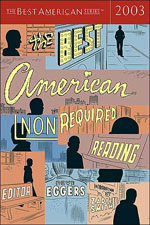[Transcribed discussion of “Selected Correspondence to Address and Redress Events Related to the Recent Flood and Subsequent Damage to Certain Housing Units,” by Paul Maliszewski and Brian Evenson, published in American Letters and Commentary.
This story is told via letters sent back and forth between a distressed resident and a couple government bureaucrats. Ed Rogozhin lives in a part of town threatened by rising floodwaters. He is requesting assistance in relocating his family. Not only are his requests continually left hanging, but he is also subjected to the insulting tones of the bureaucrats. When he mentions the details of his situation, one of the government officials chastises him for “extraneous talk” and returns his letter with the “extraneous” parts exacto-knifed out. Also, Rogozhin’s request is accidentally sent to a good-natured but oblivious Sanitation Department official. This official repeatedly reminds Rogozhin, unhelpfully, that “we can all make a difference when it comes to trash.” Meanwhile, the waters rise. Rogozhin’s earnest demeanor gives way to indignation. He is forced finally to “take temporary residence in the spacious two-car garage” belonging to his aunt.]
Bora: I thought the form was great. It’s unusual. I was trying to think of stuff I’ve read that’s written in letters. The House on Mango Street comes to mind. And I heard Jane Austen wrote the first drafts of some of her books in epistolary form. The Boy Next Door is a novel written in emails. In terms of the subject matter, I really liked it because it seems relevant to things like Hurricane Katrina. It’s making fun of how bureaucratic the relief effort by FEMA was. I think the ending is really funny, too. The way he eventually has to move his family himself and the best he can find is a “spacious two-car garage.” That’s so sad and hilarious at the same time.
Marley: I liked this, too. It was funny and sarcastic. In another way it was also really sad. The fact that the one official can’t take the time to find this guy a home, but he can take the time to cut up his letter is amazing to me. It takes longer to not help someone, but that’s what he chooses to do. And I think that’s how it is sometimes. People go out of their way to be unhelpful, just to prove a point or something.
Vicky: I liked it, especially because it connects to my experience. My mom told me stories of how she grew up. She grew up near a lake in Guadalajara, Mexico. The water would rise and sometimes flood where she lived. And I think lots of people can relate to this story, especially after all the weird weather out there. When I can connect a story to my own life, I feel closer to the story.
[Mr. Rogozhin goes rifling through his neighbors’ trash looking for things to take to the salvage yard. He’s trying to save enough money to move his family to a hotel. He earns a pittance from this salvaging, but is nonetheless told by the Sanitation Department official to return the money and to cease picking through garbage cans.]
Bora: You just feel so bad for the guy. He digs through trash for money and then they have the gall to tell him to give back the few pennies he scrounges together. The Sanitation Department guy says, “I would suggest mailing the money to their old address adjacent to you,” in the hopes that “it will be forwarded to them.” God!
Yael: The way they treat him is so crappy. It feels like middle school. It’s so institutional and rigid. People acting like robots instead of listening to someone like a real person. No one is willing to cut corners for him.
Sophia: It reminded me that my pet peeve is people who are bad at their jobs. I really hate people who don’t do what they’re supposed to do. That bureaucrat was supposed to help him find a new house, not make things more difficult than they already were. So this article made me really angry. But I think that makes it successful, too. It got me riled up. In a good way, though, because it’s a story and it shows how things are sometimes.
Subscribe to:
Post Comments (Atom)









No comments:
Post a Comment